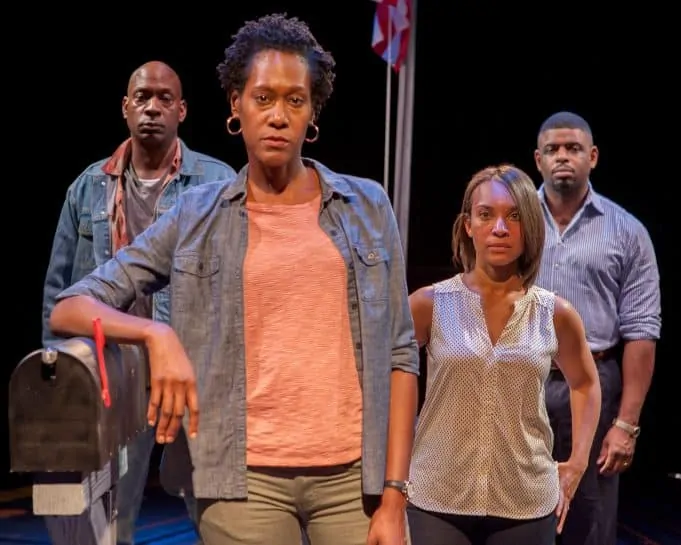Kirsten Greenidge’s new play Zenith asks a difficult question: why do ordinary people commit horrifying crimes? Specifically (in a scenario loosely inspired by a true event), how could a seemingly well-adjusted mother drive a car the wrong way on the highway, causing a deadly crash? The premise is well suited to San Francisco Playhouse’s identity as an “empathy gym”; it should offer a chance to understand a human whose motivations seem unfathomable.
Unfortunately, the play fails in this key task. The central character, Angela (Atim Udoffia), struggles to maintain a façade of perfection, even as she deals with a cheating husband, cruel fellow parents, financial worries, chronic pain, and the threat of a meeting with her neglectful, estranged mother. She has spent her life supporting her brother, friends, and children without receiving support in return. She doesn’t know how to ask for it; in the midst of a furious fight with her husband, she still texts her brother that the sky is blue and the landscape is ideal. “This is the life,” she says, even when she just wants it to end.
None of this provides the key to her actions. (It’s not enough to inspire such a drastic step, and Greenidge seems to recognize that.) We see that Angela is losing her grip on reality, perhaps as a result of her physical pain and stressful surroundings. She repeats herself, talks to absent people, and asks questions that make no sense. Greenidge avoids answering the play’s essential “why” by giving her protagonist the excuse of insanity.

Without that core, there is nothing to hold the script of Zenith together. It is to both Greenidge’s and the actors’ credits that every character has a distinctive voice and personality. But those are established early on, and the characters don’t grow in any way over the course of the piece. There’s no journey for the audience to be invested in. Maybe Hazel’s car crash will change the other characters, but the play ends without exploring the tragedy’s aftermath in depth.
That’s not to say the show is without rewards. Greenidge’s dialogue is hurried and freewheeling, with trailing-off sentences rather than pat speeches. The result is sometimes frustrating, but it also feels satisfyingly real. An excellent cast delivers the words well and makes the most of their underdeveloped parts. The small space of the A.C.T.’s Costume Shop Theater heightens the intimacy of the actors’ yells, sobs, and twinges of pain.
Dramatic talking doesn’t make a play. These characters converse deftly, but that can’t hide the fact that they have nothing to say.
2/5



